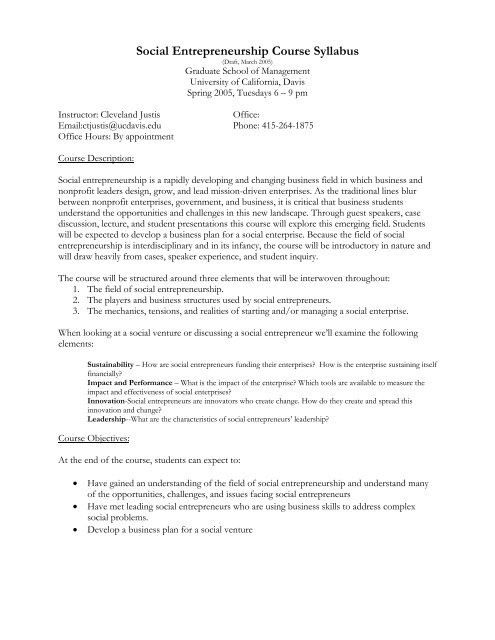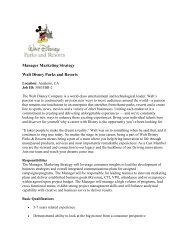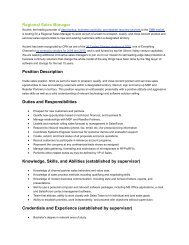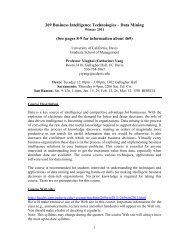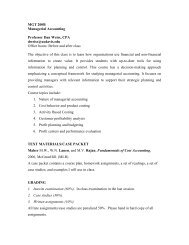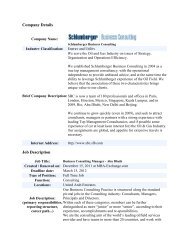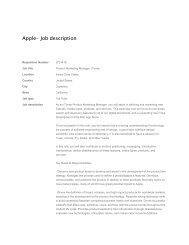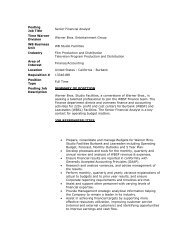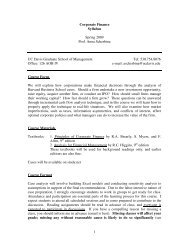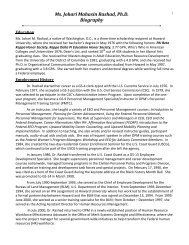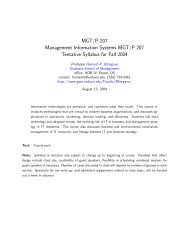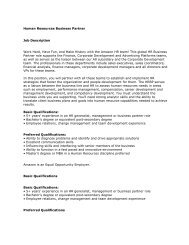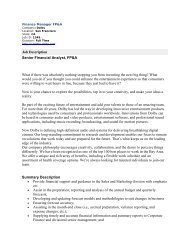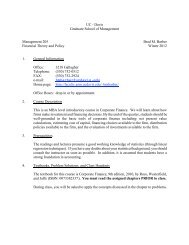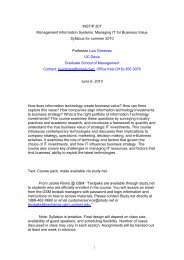Social Entrepreneurship Course Syllabus - Students
Social Entrepreneurship Course Syllabus - Students
Social Entrepreneurship Course Syllabus - Students
Create successful ePaper yourself
Turn your PDF publications into a flip-book with our unique Google optimized e-Paper software.
<strong>Social</strong> <strong>Entrepreneurship</strong> <strong>Course</strong> <strong>Syllabus</strong><br />
(Draft, March 2005)<br />
Graduate School of Management<br />
University of California, Davis<br />
Spring 2005, Tuesdays 6 – 9 pm<br />
Instructor: Cleveland Justis<br />
Office:<br />
Email:ctjustis@ucdavis.edu Phone: 415-264-1875<br />
Office Hours: By appointment<br />
<strong>Course</strong> Description:<br />
<strong>Social</strong> entrepreneurship is a rapidly developing and changing business field in which business and<br />
nonprofit leaders design, grow, and lead mission-driven enterprises. As the traditional lines blur<br />
between nonprofit enterprises, government, and business, it is critical that business students<br />
understand the opportunities and challenges in this new landscape. Through guest speakers, case<br />
discussion, lecture, and student presentations this course will explore this emerging field. <strong>Students</strong><br />
will be expected to develop a business plan for a social enterprise. Because the field of social<br />
entrepreneurship is interdisciplinary and in its infancy, the course will be introductory in nature and<br />
will draw heavily from cases, speaker experience, and student inquiry.<br />
The course will be structured around three elements that will be interwoven throughout:<br />
1. The field of social entrepreneurship.<br />
2. The players and business structures used by social entrepreneurs.<br />
3. The mechanics, tensions, and realities of starting and/or managing a social enterprise.<br />
When looking at a social venture or discussing a social entrepreneur we’ll examine the following<br />
elements:<br />
Sustainability – How are social entrepreneurs funding their enterprises? How is the enterprise sustaining itself<br />
financially?<br />
Impact and Performance – What is the impact of the enterprise? Which tools are available to measure the<br />
impact and effectiveness of social enterprises?<br />
Innovation-<strong>Social</strong> entrepreneurs are innovators who create change. How do they create and spread this<br />
innovation and change?<br />
Leadership--What are the characteristics of social entrepreneurs’ leadership?<br />
<strong>Course</strong> Objectives:<br />
At the end of the course, students can expect to:<br />
• Have gained an understanding of the field of social entrepreneurship and understand many<br />
of the opportunities, challenges, and issues facing social entrepreneurs<br />
• Have met leading social entrepreneurs who are using business skills to address complex<br />
social problems.<br />
• Develop a business plan for a social venture
Prerequisites:<br />
Other than core finance and marketing classes, there are no prerequisites for this class. This course<br />
will draw heavily upon the core classes, and will give students an opportunity to integrate the<br />
content from these core classes.<br />
Grading and Class Participation:<br />
There are five items that will comprise your grade. All assignments need to be turned in on-time.<br />
Details on the assignments will be distributed separately:<br />
1. <strong>Social</strong> enterprise summary. Due on the second class. (5% of grade).<br />
2. Conceptual proposal of business plan. Due on the third class (5% of grade).<br />
3. Case write-ups/presentations. Each student will be responsible for one group case<br />
presentation and one case write-up (15% of grade each).<br />
4. Business plan and class presentation. Written plan is due on week 9, presentation will take<br />
place on week 10. (35% of grade).<br />
• Working in groups of two to four people, develop a “business plan” for a new social<br />
enterprise of your design.<br />
5. Class participation. (25% of grade).<br />
Attendance and Class Participation:<br />
This class will rely heavily on the interaction between the students, me, and the guest speakers. As<br />
such, it is critical that you come to all classes well-prepared and ready to contribute. It is expected<br />
that you will attend all class sessions. If you must miss a session, please arrange with me in advance.<br />
Missing more than one class session may adversely affect your class participation grade.<br />
Required Readings:<br />
1. <strong>Course</strong> reader. Collection of readings and cases that are listed under individual class sessions.<br />
2. <strong>Social</strong> <strong>Entrepreneurship</strong> : The Art of Mission-Based Venture Development, by Peter C. Brinckerhoff.<br />
3. REDF, SROI Collection 2000. Available for free download at www.redf.org/publicationssroi.htm<br />
Recommended Reading:<br />
1. Raising the Bar : Integrity and Passion in Life and Business: The Story of Clif Bar, Inc., By Gary<br />
Erickson.<br />
2. Bornstein, David. How to Change the World: <strong>Social</strong> Entrepreneurs and the Power of New<br />
Ideas (Oxford University Press, 2004.
Detailed Class Schedule:<br />
April 5, 2005: Introduction to <strong>Social</strong> <strong>Entrepreneurship</strong><br />
Reading:<br />
• “The Meaning of <strong>Social</strong> <strong>Entrepreneurship</strong>”, J. Gregory Dees.<br />
• “<strong>Social</strong> entrepreneurship: What Are We Talking About? A Framework for Future<br />
Research”, Mair and Marti.<br />
• “The Change Masters” in Fast Company Magazine, by Cheryl Dahle.<br />
• “Misery Loves Company: Rethinking <strong>Social</strong> Initiatives by Business”, Margolis and<br />
Walsh in Administrative Science Quarterly.<br />
April 12, 2005: <strong>Social</strong> <strong>Entrepreneurship</strong> and the for-profit setting<br />
Assignment due:<br />
• 2 page write-up of a social enterprise.<br />
• Five-minute presentation of social enterprise<br />
Reading due:<br />
• Brinckerhoff, Chapters 1-2.<br />
• “The Good Earth”, by Alison Overholt in Fast Company Magazine.<br />
• Some Thoughts on Business Plans, Sahlman.<br />
Case:<br />
• Patagonia<br />
April 19, 2005: Philanthropy and Hybrid Ventures<br />
Assignment due:<br />
• 1 page summary of intended business plan concept<br />
Reading:<br />
• “<strong>Social</strong> entrepreneurship: Leadership that facilitates societal transformation— An<br />
exploratory study” by Alvord, Brown, and Letts.<br />
• “The Competitive Advantage of Corporate Philanthropy,” Porter and Kramer.<br />
• “The Citizen Sector: Becoming as Entrepreneurial and Competitive as Business”,<br />
Drayton<br />
• Brinckerhoff, Chapters 3-5.<br />
Case:<br />
• Newman’s Own
April 26, 2005: Nonprofits, Governments, and <strong>Social</strong> <strong>Entrepreneurship</strong><br />
Reading:<br />
• Being “Business-Like” in a Nonprofit Organization: A Grounded and Inductive<br />
Typology”, Dart.<br />
• “The New Landscape for Nonprofits”, Ryan.<br />
• Brinckerhoff, Chapters 6-8.<br />
Friday, April 29, 2005: Optional visit to Clif Bar, Inc. in Berkeley, Time: TBA in afternoon<br />
May 3, 2005: Measuring and Managing Performance<br />
Reading:<br />
• A Report From the Good Ship SROI, Gair., REDF, SROI Collection 2000. Available for<br />
free download at www.redf.org/publications-sroi.htm.<br />
• Brinckerhoff, Chapters 10-12.<br />
May 10, 2005: Capital/Funding/Financing<br />
Assignment due: Progress report on business plan development.<br />
Reading:<br />
• “Sources of Financing for New Nonprofit Ventures,” Dees & Dolby.<br />
• “The Replication of <strong>Social</strong> Venture Partners,” Evans School of Public Affairs.<br />
• Brinckerhoff, Chapter 9.<br />
Cases:<br />
• New Schools Venture Fund (A)<br />
• Northeast Ventures<br />
May 17, 2005: Marketing in <strong>Social</strong> Ventures<br />
Reading:<br />
• Focusing the <strong>Social</strong> Marketing Concept, Rangan et al.<br />
• “A Roadmap for Natural Capitalism”, Lovins et al.<br />
May 24, 2005: The tensions/challenges<br />
Case:<br />
• Nature Conservancy<br />
May 31, 2005: Other Important Issues: Scaling/Legal issues/Change<br />
Assignment due:<br />
• Written copy of completed business plan<br />
June 7, 2005: Final presentations and conclusion<br />
Assignment due: Student presentations of business plans, entrepreneur feedback
The Roberts Enterprise Development Fund (REDF)<br />
38 Keyes Avenue, Suite 100; PO Box 29566; San Francisco, CA 94129-0566<br />
(415) 561-6677; http://www.redf.org or info@redf.org<br />
REDF is a project of the Roberts Foundation in the San Francisco area. It was created to "expand economic<br />
opportunity for homeless and very low-income individuals through the creation of social purpose business<br />
ventures." The REDF provides multi-year funding to social entrepreneurs and access to business technical<br />
assistance from MBA interns, and access to the marketplace through its Partners-for-Profit.<br />
VenturePhilanthropyGuide.org<br />
http://www.venturephilanthropyguide.org<br />
Created by Natasha van Bentum, a fundraiser for Greenpeace Canada, in Vancouver, this Web site<br />
provides information about venture philanthropy -- a movement that seeks to apply some of the techniques<br />
of venture capitalism to the nonprofit world -- and discusses the challenges it poses for fund raisers. The<br />
site also offers links to organizations that promote venture philanthropy and to articles and Web sites that<br />
provide additional information.<br />
Ewing Marion Kauffman Foundation<br />
4801 Rockhill Road; Kansas City, MO 64110-2046<br />
816-932-1000; www.emkf.org or info@emkf.org<br />
This foundation strives to identify unfulfilled societal needs and to develop, implement and/or fund<br />
breakthrough solutions in the areas of education, and entrepreneurship, including not-for-profit<br />
entrepreneurship. The Kaufman Foundation has been at the forefront of supporting and financing the<br />
development of the social entrepreneurship sector.<br />
<strong>Social</strong> Venture Partners<br />
1601 Second Ave., Suite 605; Seattle WA 98101<br />
(206) 374-8757; www.svpseattle.org or info@svpseattle.org<br />
A nonprofit, volunteer-driven organization dedicated to addressing social and environmental issues in the<br />
King County region of Washington. Each Partner commits to a minimum annual contribution of $5,500 for<br />
at least two years. As responsible investors, Partners have a genuine interest in providing whatever it takes<br />
to help bolster the success of every one of their “investees”. SVP model has been duplicated in the<br />
following cities/areas: Arizona, Austin, Boulder County; Boston, British Columbia, Calagary, Central<br />
Florida, Cleveland, Dallas, Denver, Houston, Kansas City, Minnesota, New York, Pittsburgh, Portland,<br />
San Francisco Bay Area, San Diego, and St Louis. SVP affiliates starting soon: Alaska, Chicago,<br />
Delaware, London, Orange County, Tokyo Bay, Toronto, and Washington, DC. SVP will help develop<br />
other sites as well.<br />
The Denali Initiative<br />
1650 Metropolitan Street, Suite 250; Pittsburgh, PA. 15233<br />
(412) 322-1773, X201; denali@mcg-btc.org<br />
The Denali Initiative is an opportunity for leaders in the nonprofit sector to become more entrepreneurial in<br />
their efforts to meet community needs. The program provides participants with the skills, tools and capital<br />
they need to implement outstanding social enterprise projects.<br />
<strong>Social</strong> Enterprise Alliance<br />
43 South Cassady Road; Columbus, OH 43209<br />
(614) 235-0230; www.se-alliance.org<br />
The two organizations National Gathering for <strong>Social</strong> Entrepreneurs and SeaChange have merged to form<br />
the new organization – <strong>Social</strong> Enterprise Alliance. This is the only membership organization devoted<br />
exclusively to building nonprofits through earned income strategies. The purpose of this new organization<br />
is to improve the effectiveness and sustainability of nonprofit organizations that employ earned income<br />
strategies to achieve social objectives and to engage others who support these endeavors.<br />
2
EntreWorld<br />
http://www.entreworld.com/<br />
This web site is supported by the Kaufman Center for Entrepreneurial Leadership and is geared towards the<br />
for-profit world but contains many resources that would be of interest to any entrepreneurial organization.<br />
EntreWorld is designed to increase staff productivity by getting them essential information as quickly and<br />
easily as possible. Recognized by USA Today, Forbes, Inc. and Fast Company as a premier online resource<br />
for small business owners, the EntreWorld search engine delivers the best and most useful information,<br />
guidance and contacts for the entrepreneur.<br />
Harvard Business School Initiative on <strong>Social</strong> Enterprise (The Initiative on <strong>Social</strong> Enterprise)<br />
Harvard Business School<br />
Loeb 34, Soldiers Field; Boston, MA 02163<br />
(617) 495-6421; se@hbs.edu<br />
The Initiative provides extensive research, publications, executive education and MBA courses and<br />
conferences.<br />
The Center for Entrepreneurial Leadership Clearinghouse on <strong>Entrepreneurship</strong> Education<br />
CELCEE c/o UCLAA325G Moore Hall<br />
405 Hilgard Avenue; Los Angeles, CA 90095<br />
1-888-4-CELCEE (1-888-423-5233); celcee@ucla.edu or http://www.celcee.edu<br />
CELCEE acquires information related to entrepreneurship education from diverse sources, including<br />
journal articles, websites, syllabi, conferences, pamphlets, curriculum guides, government publications,<br />
videos, books, computer software, and more. Rather than scour libraries, government offices, universities,<br />
private collections, and other locations for relevant materials, CELCEE allows you to conduct all your<br />
research from one easy-to-access online source.<br />
<strong>Social</strong> <strong>Entrepreneurship</strong>: Mobilizing Resources for Success<br />
By Gregory Dees, Stanford Business School<br />
Grantsmanship Center Magazine, Issue 44. Summer 2001 Issue<br />
TGCI, Department DD-W; PO Box 17220; Los Angeles, CA 90017<br />
(212) 482-9860; www.tgci.com<br />
If you are a staff member of a nonprofit organization or government agency you can receive a free<br />
subscription to the Grantsmanship Center magazine. To subscribe see on-line form or mail request.<br />
Merging Mission and Money: A Board Member's Guide to <strong>Social</strong> <strong>Entrepreneurship</strong><br />
National Center for <strong>Social</strong> Entrepreneurs<br />
www.socialentrepreneurs.org<br />
Nonprofit Times Column: Insights from the National Center on <strong>Social</strong> Enterprise Pricing in the<br />
Nonprofit Sector<br />
By Sharon Oster<br />
Yale School of Management<br />
www.nationalcne.org/pubs/oster01.htm<br />
Generating New Resources of Revenue, and Not Just Raising Funds for Consumer Directed<br />
Programs, 2002<br />
Leah Dobkin<br />
NCOA<br />
409 3 rd Street SW; Washington, DC 20024<br />
800-424-9406; www.ncoa.org<br />
Unleashing New Resources and <strong>Entrepreneurship</strong> for the Common Good a Can, Synthesis, and<br />
Scenario for Action, January 1999<br />
By Thomas K. Reis and Stephanie J. Closhesy<br />
WK Kellogg Foundation; (616) 969-2160<br />
3
Nonnprofit_entrepreneurship<br />
Andrew Horsnell, Co-founder of Authenticity Consulting<br />
http://www.egroups.com/group/nonprofit_entrepreneurship<br />
An online forum for discussing business ventures by nonprofit organizations. Topics of discussion include<br />
how to measure whether a charity is ready to start a business, identify business opportunities, and develop<br />
a business plan, as well as the risks and benefits of starting a for-profit venture.<br />
The <strong>Social</strong> Entrepreneur's Resource Page<br />
Roberts Enterprise Development Fund<br />
http://www.redf.org<br />
This Web site includes the fund's 1996 book, New <strong>Social</strong> Entrepreneurs: The Success, Challenge, and<br />
Lessons of Non-Profit Enterprise Creation, which can be downloaded. The book profiles 22 charities in the<br />
San Francisco area that have started businesses to provide employment for homeless people and discusses<br />
what it takes for a nonprofit business venture to succeed. The site also offers advice to nonprofit<br />
organizations that are considering whether to start a business venture and links to Web sites that provide<br />
additional information.<br />
Venture Philanthropy Partners<br />
1201 15 th St. NW, Suite. 420; Washington, DC 20005<br />
www.venturephilanthropy.org or feedback@venturepp.org<br />
Venture Philanthropy Partners prepared a useful report called Effective Capacity Building in Nonprofit<br />
Organizations published by McKinsey & Company, that brings some common language to the discussion<br />
of capacity building and offers insights and examples of how nonprofits have pursued building up their<br />
organizational muscle. The report contributes to the growing national conversation about how to help<br />
nonprofits become stronger, more sustainable and better able to serve their communities. McKinsey &<br />
Company prepared the study at the request of VPP. McKinsey also developed a practical assessment tool<br />
for this report that nonprofits can use to measure their own organizational capacity.<br />
Authenticity Consulting<br />
4008 Lake Drive Avenue North; Minneapolis, MN 55422-1508<br />
(763) 971-8890/800-971-2250; http://www.np-biz-dev.com/#anchor1135576LLC or<br />
www.authenticityconsulting.com<br />
Has free resources about organization development and social entrepreneurship and a free on-line<br />
assessment of nonprofits "health" at www.managementhelp.org<br />
Books and Videos<br />
Joint Ventures Involving Tax-Exempt Organizations, Second Edition<br />
By Michael I. Sanders<br />
John Wiley & Sons; 595 pages; $200<br />
(201)748-6000; www.wiley.com<br />
Explains the regulations and laws that govern joint business ventures involving charities and businesses.<br />
Outlines tests that the Internal Revenue Service uses to evaluate such ventures. Other topics discussed<br />
include the unrelated-business income tax, which the IRS levies on money raised through activities it<br />
determines to be outside an organization's charitable mission; debt-financed income; bonds; investing<br />
through limited-liability companies; and for-profit partnerships between businesses and universities,<br />
business leagues, and foreign organizations.<br />
4
The Nonprofit Entrepreneur<br />
Edited by Edward Skloot<br />
The Foundation Center; 170 pages; $19.95 plus $4.50 postage and handling<br />
79 Fifth Avenue; New York, NY 10003<br />
(800) 424-9836; http://fdncenter.org<br />
Explains how nonprofit organizations can run successful business enterprises that generate income and<br />
help the organization carry out its mission. Includes case studies. Published by The Foundation Center.<br />
<strong>Social</strong> Purpose Enterprises and Venture Philanthropy in the New Millennium, Volumes I, II, and III<br />
The Roberts Enterprise Development Fund; 416 pages; $35 including postage and handling<br />
(415) 561-6677; www.redf.org<br />
Three-volume set that examines businesses that are owned and operated by nonprofit groups and exist for<br />
the sole purpose of employing poor, unskilled workers. Volume I, Practitioner Perspectives, written by<br />
directors and managers of social-purpose businesses, addresses the difficulties inherent in such ventures.<br />
Volume II, Investor Perspectives, presents the insights of the people and organizations that fund these<br />
businesses. Volume III, Practitioner Profiles, features the personal stories and strategies of a variety of<br />
people who have founded social-purpose enterprises.<br />
The Unrelated Business Income Tax<br />
By Gerald M. Zack<br />
Nonprofit Resource Center; 150 pages; $36 for members, $49 for non-members<br />
1700 Rockville Pike, Suite 400; Rockville, MD 20852<br />
(800) 883-6247; http://www.nonprofitresource.com<br />
Explains the tax that nonprofit organizations must pay on income from business ventures that are not<br />
related to their missions. The Nonprofit Resource Center Internet Service is a Web site which includes a<br />
searchable database of businesses that provide important products and services to nonprofit organizations.<br />
Nonprofit Piggy Goes To Market<br />
The Society For Nonprofit Organizations; non-member price: $13 member price: $10<br />
5820 Canton Center Road, Suite 165; Canton, MI 48187<br />
(734) 451-3582; http://www.snpo.org<br />
Must reading for organizations considering projects and programs to create new, unrestricted income<br />
streams.<br />
<strong>Social</strong> <strong>Entrepreneurship</strong><br />
By Jerr Boschee<br />
http://www.snpo.org<br />
The Learning Institute For Nonprofit Organizations<br />
From the award-winning "Excellence In Nonprofit Leadership And Management" series, this entertaining<br />
Videotape deals with using entrepreneurial strategies to further social causes. It sheds light on why<br />
nonprofits are aggressively adopting entrepreneurial strategies, and it provides a tool for assessing<br />
activities from both a mission and an earned income perspective. Viewers will also learn more about the<br />
critical success factors identified by pioneers in the field. CEUs are available from the University of<br />
Wisconsin-Extension for viewing the tape and completing included assignments. CEUs and a "Certificate<br />
of Excellence in Nonprofit Leadership And Management" are available for viewing and completing all<br />
assignments in the eight-part series: "Strategic Planning," "Resource Development," "Board Governance,"<br />
"Marketing," "Mission-Based Management," "<strong>Social</strong> <strong>Entrepreneurship</strong>," "Volunteer Management," and<br />
"Strategic Alliances." Videotape (Group Presentation Module): purchasers are entitled to use the videotape<br />
as often as they'd like for non-broadcast, group presentations and to charge an admission fee.<br />
5
Venture Fund Initiated<br />
(201) 894-8950; http://ventures.yale.edu or venturesinfo@yale.edu<br />
The New Pew Memorial Trust funded $3 million over 3 years to Yale University for the Business Plan<br />
Competition for Nonprofits. The grant was approved September 2001 in support of the Business Plan<br />
Competition for Nonprofits, an initiative to provide targeted guidance and resources to existing nonprofits<br />
most capable of launching and operating revenue-generating business ventures.<br />
A Nonprofit Guide To Developing And Implementing An Income Stream Venture<br />
Clohesy Consulting<br />
1008 W 18 th Street; Cedar Falls, IO 50613<br />
(319)277-4130; Clohesy-consulting@cfu.net<br />
Builds upon the excellent Q&A from Roberts Enterprise Development Fund.<br />
<strong>Social</strong> Enterprise Initiative, Harvard Business School Supplement to Nonprofit and Voluntary<br />
Sector, Quarterly, Vol. 29, Number 1, Supplement 2000<br />
http://www.hbs.edu/socialenterprise/storyarchive/research/summer99.r2.html or<br />
http://www.hbs.edu/socialenterprise<br />
A special issue on corporate nonprofit relationships and differences. There are a number of good articles in<br />
this journal. Check it out.<br />
Generating New Resources and Not Just Raising Funds for Consumer Directed Programs<br />
By Leah Dobkin<br />
National Council on Aging<br />
409 Third Street SW, Suite 200; Washington DC 20024<br />
800-424-9046; www.ncoa.org or www.consumerdirection.org<br />
6


